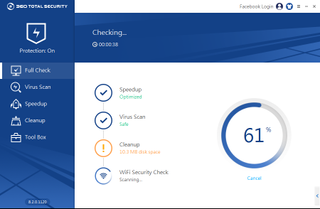
Just because an antivirus suite is free doesn’t mean it won’t cost you something. There’s security software that shackles your system with upgrade nags, dimwitted scanning slowdowns, and other bloat that pokes open more holes than it patches.
Some A/V packages give you just a sample, with hidden fees awaiting once you install and get hooked. Even when the features are there, a free price often means putting up with obscure interfaces or muddy menus that leave you scrambling for non-existent support.
The established players in the antivirus game have all taken advantage of this unfortunate trend, diluting their focus with hostile, pay-to-win features that leaves the field open to fresh competition. Products like Qihoo’s 360 Total Security are leaders of this welcome alternative antivirus wave, and when you take a closer look at what’s on tap it’s easy to see why the status quo is being challenged by smart newcomers.
This new landscape makes picking a package you can trust a tough job, so it’s wise to check and to make sure every feature you need is there, and all the slowdown sludge you don’t isn’t. Applying a set of best-practice principles as a checklist for each antivirus package is revealing, and helps narrow down the field to a few smart choices.
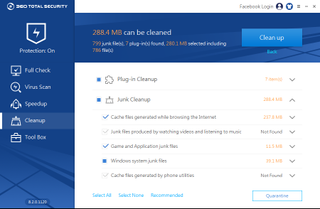
Clean, crisp, and clear; from installation to interface, on the desktop and beyond
Set up should be a snap, with straightforward instructions and clearly marked options that forgo the shady interrogation tactics that accompany dodgy installations. Antivirus functions should be accompanied by a full complement of anti-malware tools; an essential feature pay packages don’t employ yet. Even if you have trusted anti-malware installed from an outside vendor, it’s nice to have options and be able to check particularity suspicious files with a reliable back-up scanner at the ready.
Superior antivirus suites don’t insist on proprietary solutions. Packages like Qihoo’s 360 Total Security don’t lock you into a single vendor’s scanning engine, for example. In addition to 360’s Cloud Scan Engine, System Repair Engine, and QVMII AI Engine, you also have the choice of both Avira- and Bitdefender-sourced protection added to the mix, giving you the core system security of your choice and making it easy to pick and choose from a buffet of options. Manufacturers shouldn’t quibble over turf or who invented what when it comes to security.
Moreover, support shouldn’t end at the Windows desktop. Smartphone, tablet, Android, and Mac versions add up to a hardware and multi-OS software ecosystem that knows system security from every angle and provides a uniform experience no matter where your technology takes you. Once you know 360, you’re qualified to secure anything you own.
What to look for: two tiers are plenty
A light system footprint can mean less-than-heavyweight results, but a tightly written product always punches well above its weight class, ably going toe-to-toe on features and scanning results against the chubby competition, pay package or otherwise. A basic edition, pared down to the essentials for hardcore system speedsters, is a good sign a vendor has their act together since there’s no place to hide fat code in a lean handy package.
Well rounded basic scanners include core antivirus and malware functions along with internet protections, shopping security, and ID theft protection along with full sandboxing. Areas often overlooked in lean solutions, such as webcams hacks, USB key drives exploits, and advanced keylogger detection should also be present and accounted for. These vulnerabilities aren’t so rare anymore.
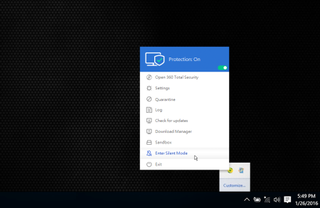
This permits maximum gaming performance while retaining a full suite of tools as a protective layer to repel and treat any type of system problem. Another must-have for gamers is a silent mode that mutes notifications during full screen fragging sessions so pop-ups don’t turn into scoreboard slaughter-fests. All that’s missing are the frame-rate drops, drive contention, or screen recording delays commonly introduced by more meddlesome mainstream packages that ask you to pay for the privilege.
Next on the list: A level-up full edition that adds features without flab
People with laptops, wireless networks or complex computer setups have special security needs and require some extra protection the average desktop speedster doesn’t. A step up package – just one is plenty - that adds Wi-Fi protection as well as PC check and clean functions for everyone is what to look for here.
These extended features usually smooth the boot process, identify and delete junk files, clear out old extensions, and even check for patches on important software, such as Microsoft Office, an infamous infection vector that can act as a backdoor on an otherwise fully secured system when left unpatched.
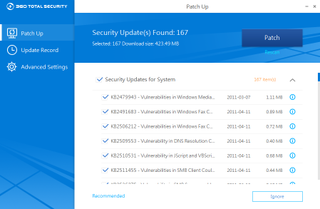
Ideally, you shouldn’t have to pay for the extra features found in a full edition but finding suites that don’t charge narrows down the field considerably. Microsoft deserves some credit for Windows Defender, which provides protection without cost, but it’s weak on advanced features and performance. Qihoo does better here by providing two levels of support with 360 Total Security both free of charge, the Full version which handles security, performance tools and Wi-Fi and the Essential version which acts as a lighter version of the Full for those who only want to focus on basic security.
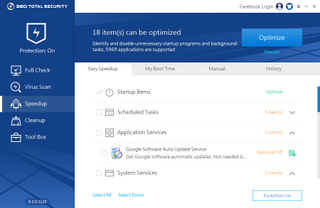
All of this adds up to a refreshing change of pace, and a welcome new direction for antivirus software. Let’s see if the old guard catches on. In the meantime, do yourself a favor and check out one of the new wave of antivirus products like 360 Total Security. You might find it just as good as fixing frustrations wrought by its antivirus competitors as is it at fixing viruses themselves.
Author: Jack Burton
Sponsored by 360 Total Security
The biggest gaming news, reviews and hardware deals
Keep up to date with the most important stories and the best deals, as picked by the PC Gamer team.
